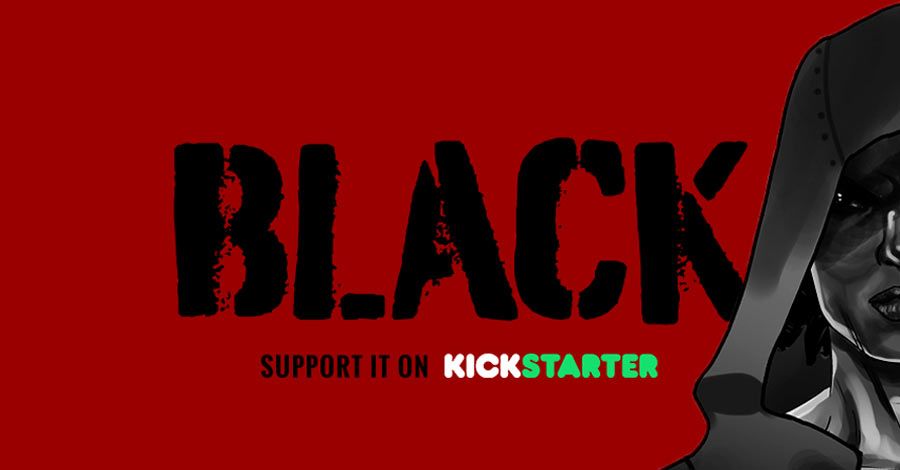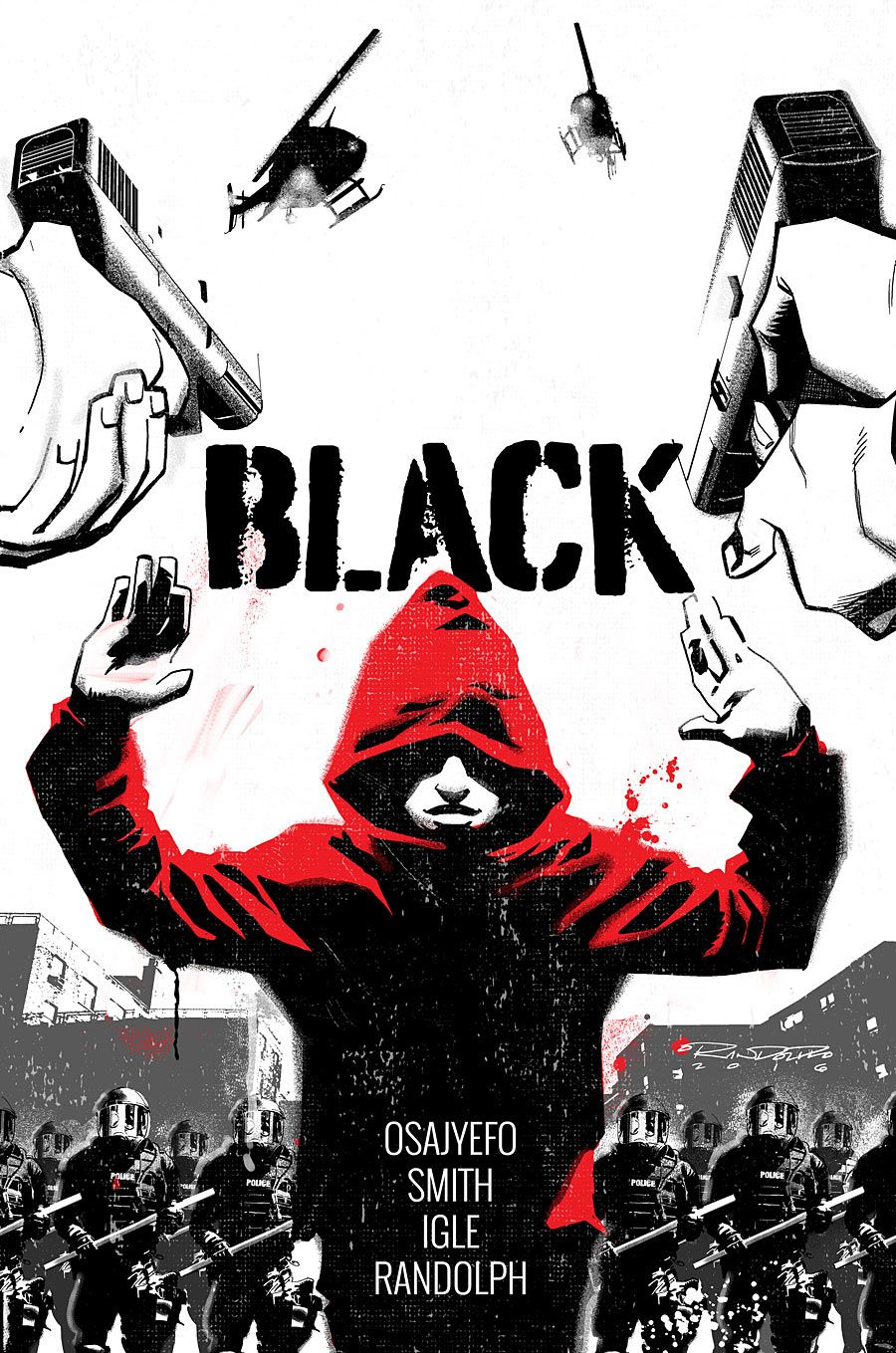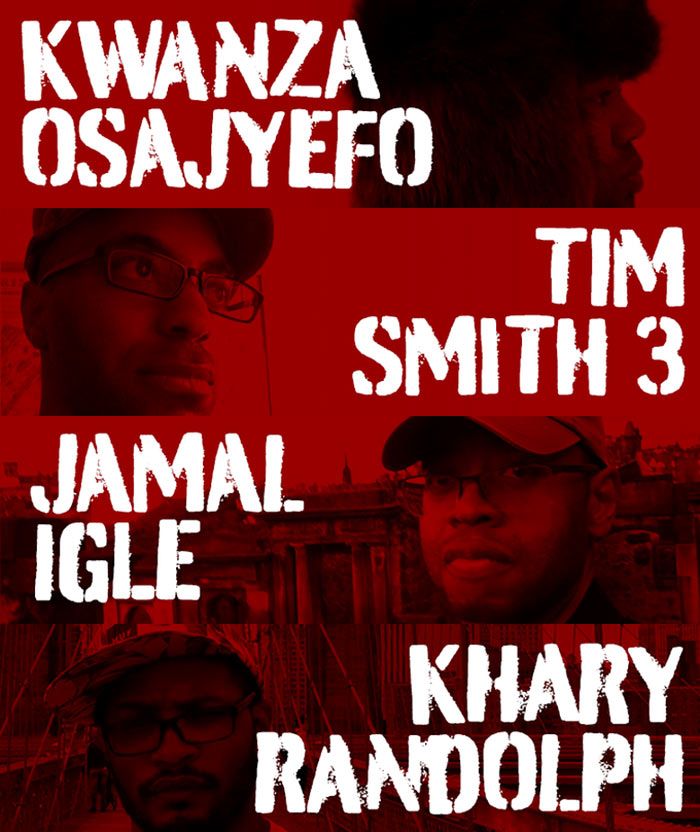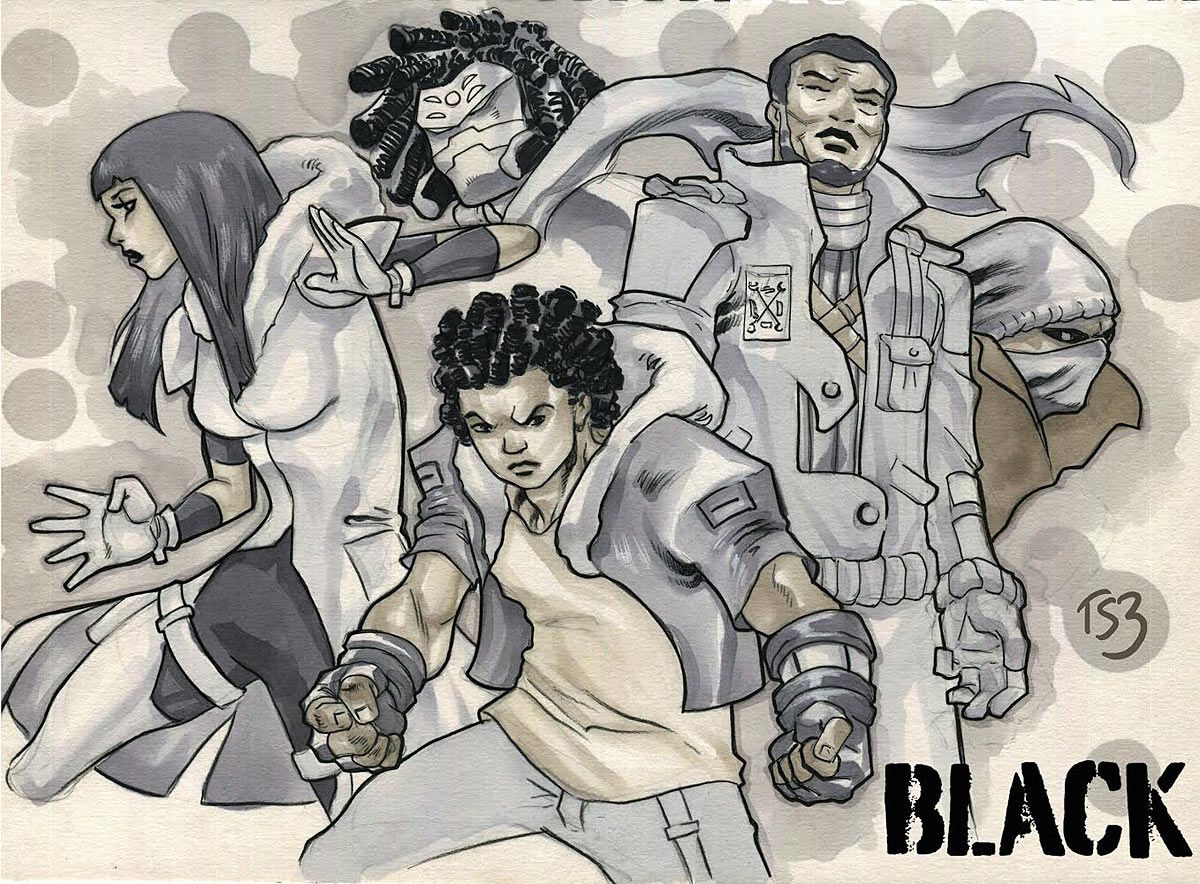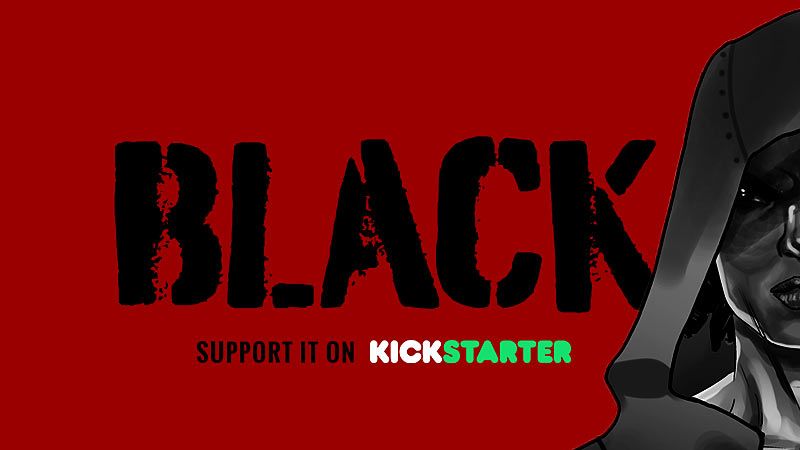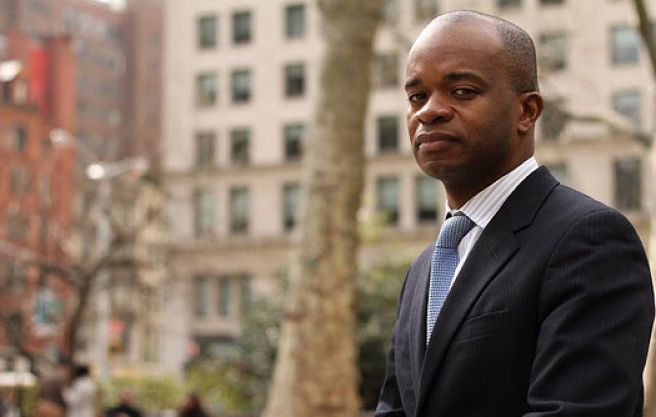One week ago, the Kickstarter campaign for the graphic novel "BLACK" premiered, based on the premise of a world in which only Black people have superpowers. In less than a week, "BLACK" reached its funding, and as of this writing is more than 125% funded.
RELATED: Igle, Randolph & More Launch "BLACK" Graphic Novel Kickstarter
I spoke with the "BLACK" creative team of Kwanza Osajyefo, Tim Smith 3, Jamal Igle, and Khary Randolph for a candid conversation about Black superheroes, controversy and operating outside of the comic book industry's Direct Market to make an impact.
Joseph Phillip Illidge: "BLACK" speaks to the potency of the idea of Black empowerment within an oppressive nation, through the metaphor of exclusive ownership of superhuman powers. Similarly, "BLACK" has you four Black men as the creative managers of the idea and world. Was this crucial and necessary in your opinion, for a union of Black men to craft a fantastic, controversial narrative about Black superhumanity in America?
Kwanza Osajyefo: Truth was crucial. The truth that despite our long careers in the comics industry, our voice in the creative culture that leads in the medium is grossly absent. "BLACK" reflects a systematic omission of our narrative in the U.S. and comics.
Exclusion was crucial. Suppression of our people is part of this country's foundation and pervades today. Its deep history reverberates in the present through subtleties culminating in unavoidable hurdles.
This is a story we all share. That because of skin color, we can't drive in certain areas, fear police violence, and lack certain opportunities... among our diverse backgrounds these matters are universal.
Tim Smith 3: For me, this is a way to really tap into the cultural understanding: create a story derived based on a lifetime of experiences. It will make for a more authentic development in the book. There are big and small details that I understand 100%. That's what sets this apart from other stories out there.
There are things in life we can all relate to, no matter who you are. From having money issues, to relationships within your family. Those are all common themes we as a society can understand, but where it gets deeper is how we tackle those issues with actions that have been ground into our very being due to generations of circumstances.
Jamal Igle: I can only speak for myself, but when you think about it the idea really requires a bit of ingrained authenticity. There's a certain aesthetic to life as an African American that unless you've lived it, you don't understand it. I'm not just talking about the surface level things like music, or clothing. Those things are superfluous, and even amongst the four of us we come from very different points of life. The one common thread is a deep, penetrating need within African American society to be recognized as human beings and carve out a place for ourselves within American culture. We also have a need to be recognized for our individuality amongst our own people. So when Kwanza and Tim first approached me about drawing the series, I immediately saw the potential of telling a different story that touched on the theme of survival in America.
Khary Randolph: I think it's important to speak about what you know. It is true that a good writer should be able to write from any point of view, of course. But there is a certain understanding that comes when it's a little closer to home. It's little things like how someone might wear their hair, or certain catches of phrase, or any number of things that are more than surface level that you would only know if you are a black person. I would imagine it would be exactly the same if you were a White woman, or an Asian man, or Italian, gay, transgender, etc.
And another thing, which I believe was touched on before by Jamal -- we are all from very different places and have different points of view. We don't all share the same ideologies. We have discourse and discuss things and agree and disagree like anyone else. All of this goes into making a project like "BLACK" a well-rounded group effort.
"BLACK" is, quite frankly, dangerous. Your involvement in the project and your various public statements may serve to draw a line in the cement of this industry. Why were you willing to take such a risk, knowing that you may be blowing up bridges and endangering relationships by picking up the 800-pound gorilla of racism and throwing it at the American Superhero Comic Book Corporate Complex?
Osajyefo: I sometimes think I sat on the idea of "BLACK" out of concern for associates during, and just after, I worked at DC Comics. Let's keep it 100, people get blacklisted for minor offenses to certain egos within the establishment. Yet the truth "BLACK" represents is undeniable, so I don't feel there's much risk to us so much as opposition.
One thing I learned from working on Zuda was that community is a strong force, and the internet a powerful tool for democracy. The fact that "BLACK" exists highlights something amiss in the comics industry.
In this modern context, what would denying "BLACK" win anyone save being put on blast for proving its existence is warranted? Better to spend that energy on re-evaluating what's missing from your business. We've seen the clumsy manner in which "diversity" has trended, anything other than supporting or complimenting "BLACK" would be playing checkers instead of chess.
Smith 3: I see it not as taking a risk, more just a way to tell a great story. How people take it from there is all on them.Being in the industry as long as I have, I have heard and read so many points of view from creators. And when I was told about these awesome stories of heroism and feats, it was well understood that the characters were not black. No one seemed to question if we as a society would feel that the actions of any mainstream book were going too far. It was what it was and is what it is. Meaning, the hundreds of comic books, movies, TV shows, commercials and even ads on the street and magazines feature one side of a viewpoint. No one came up and said they have to be that way, it was just understood to be that way.
I never hated it. It was cool to see and read awesome stories of people saving the galaxy and stopping the bad guy, all while being the underdog. Those are some of the best books right? Where the character is at the bottom, but has a unique talent and makes the choice to do good or evil.
Those are fantastic stories! So here is another one, a world where the underdog has something that sets them apart from the rest. And the choices they make along the way to becoming something more.
Readers are ready for something like this. They always have been.
Igle: These days I don't see it as much of a risk. I've been spending the last few years basically trying to carve my own path with projects that are either personal to me or interesting. The few jobs that I've taken that were strictly freelance jobs I took because it was either something I would never have imagined doing, like a story where KISS fights demons during prohibition era Chicago.
As far as the subject of "BLACK" goes, anyone who follows me on social media knows I can be opinionated. Okay, more than opinionated actually. I love political discourse, I speak out on social justice issues. So it's more an extension of the things I already believe in and making them manifest.
Randolph: I'd be lying if I said this kinda stuff didn't occur to me. But I mean, what is life without risk? I've already uprooted my entire life once to leave home and come to New York to become a comic book artist. That's crazy. You can play it safe with your career and your life but what will you have to show for it? This was a good opportunity to be a part of something important. With every project you want to work with good people, and these are some of the best. Kwanza had a very strong vision and I believed in it.
And lastly, if something like "BLACK" would endanger my relationships, chances are you were probably weren't $%^&in' with me anyways.
Your Kickstarter campaign for "BLACK" succeeded, in part, because it was executed with the apparent strategy of a military operation and the impact of a jackhammer. Tell me about what it took for you to pull that off, as professionals in a business where confidentiality is becoming tougher to maintain, and even the biggest companies have leaks like a sieve.
Osajyefo: Strategy is understanding the terrain, opposition, and your own capabilities. Camaraderie was the real key. I've built relationships and friendships in the industry based on mutual respect and honesty. That is what made the team behind Zuda work so smoothly. I didn't always witness that kind of closeness in other departments at DC.
A while back, I read a message from a new staffer at Marvel about feeling excluded from company convention parties. There are times when business requires seclusion, but I've often seen it used as designation of privilege. That cliquishness in regards to rank, race, age, and gender at publishers breeds animosity. In the age of the internet that can quickly be put on display for all to see.
It also hurts the product when only "the chosen" are allowed to participate. My colleagues and associates bring different perspectives to "BLACK" for a holistic approach to the narrative.
Smith 3: It's a simple formula to me. Kwanza did a great job making sure this got out in the social media world. We all then pushed this along the same channels. But the other side to this was the people that wanted to see it happen! I can stand in the park and talk out loud all day, but it's going take folks to come over and listen. So yeah, I thank all the folks out there for listening and wanting to hear our message.
Igle: An organized effort, led by Kwanza. Making ourselves available to the press and constantly pushing ourselves in social media.
Randolph: BLACK OPS! Naw, for real, I'm frankly still reeling from the success myself. I remember before this thing went live I told the team "I have no doubt this thing will get funded," which I 100% believed, but I never thought we would do it in under a week. That said, this was a well organized team effort -- not only from us but so many other people that didn't get the public face time we did, like Sarah Litt, our editor, the awesome people at SuperFan PR, our cameraman Thor Neureiter. You can't do this this kind of thing alone.
But the secrecy part was easy, it's already part of the job. NDAs weren't even necessary. We are not a giant company, this is a tight-knit group of like minded individuals. There would be nothing to gain from leaking this.
In mainstream comics, popular Black characters written by both Black and White writers have become means through which publishers can declare intentions of diversity initiatives. Can "BLACK" succeed in a way that such intellectual properties cannot? Can "BLACK" go to places where Luke Cage and Black Panther cannot operate? Or do Marvel's African-American Captain America and DC Comics' Cyborg walk hand-in-hand with "BLACK," and accomplish the same goals?
Osajyefo: The intention is greatly appreciated. Though I think the efforts still represent a shallow understanding of what's at issue, which is inclusion as much as diversity. Any writer worth his or her craft will research their subject, but I think Marvel and DC will struggle with creating something substantial until they internalize this matter in regards to staffing.
Thinking that adding brown faces fixes the problems stems from a pervading White perspective on issues of race; it will limit at least their comics universes from going where "BLACK" will. They may have opportunity in a cinematic universe that is grounded more in reality and hasn't established a universe where racism is not believable.
Smith 3: I cannot say if any other mainstream companies could take what we are doing to such a level. Marvel did the "Truth," an awesome story about a black man being the test subject for the serum that would one day lead to Super-Soldier serum and Captain America. I thought that was good. I cannot say why more books don't come along with such an impactful idea. "BLACK" will bring something to the table that has not been seen at all on the comic shelves.
Igle: I believe that the mainstream comics industry would love to be able to be more controversial and progressive. Unfortunately it is less like moving an 800-pound gorilla as it is trying to tip an ocean liner with a popsicle stick. A larger, corporation-controlled company would never be able to do this story. A lot of editors would be afraid of trying to pitch something they would see as racially charged to their bosses. There are less considerations on our part. We're not beholden to stockholders worried about making a movie or selling action figures.
Randolph: In my mind it's not an us or them thing. Every voice has a role to play, and we have ours. It doesn't make something like a Luke Cage or a Cyborg any less important. Martin Luther King, Jr. and Malcolm X may have had different methods, but they both had the same goal.
Finally, are you ready for what comes next? A potentially controversial project like "BLACK" will bring criticism from the ignorant, as well as the intelligent and informed. Why is "BLACK" worth the inevitable battle ahead for you and your allies?
Osajyefo: I'm less bothered by the ignorant so much as the indignant. Those who are contrary to what "BLACK" represents are far less dangerous than those who deny it. Overall, I'm not worried. What will happen -- companies I don't want to work at won't hire me? I'm not in this to get a gig writing Batman.
"BLACK" is about who we are as humans, and how we see each other. It's about communicating an idea and perspective that some may never have been exposed to or ignore. That exposure should be a time for reflections, discussion, and fostering growth. But as my great-grandmother often said, "If you show your ass in public, it's sure to get spanked."
Smith 3: I have to battle this type of controversy every day, all my life. I do it with the biggest smile. I can't hide my skin from the world. I have heard the ignorant speak to me as plain as day about everything. But with all that, we still did this, and the people responded and said yes we want more. So I do this for me, for the team, and for the people who want to see it unfold.
Igle: Absolutely, because it's nothing I haven't had to deal with before. I've had to deal with less evolved opinions while working on "Firestorm," when Jason Rusch was the lead character as well as on Supergirl, a book you wouldn't think would be controversial. As to why it is important? Because based on the response so far, this is something that's been needed by people for a long time.
Randolph: Criticism is inevitable. Have an opinion and someone will always have a counter-opinion. That's life. But this is an opportunity to tell a story that can't be told anywhere else. And at the end of the day, this is a project that is important.
For everybody, not just black people.
Joseph Phillip Illidge is a public speaker on the subjects of race, comics and the corporate politics of diversity. In addition to his coverage by The New York Times, CNN Money, the BBC and Publishers Weekly, Joseph has been a speaker at John Jay College of Criminal Justice, Digital Book World's forum, Digitize Your Career: Marketing and Editing 2.0, Skidmore College, The School of Visual Arts, Purdue University, on the panel "Diversity in Comics: Race, Ethnicity, Gender and Sexual Orientation in American Comic Books" and at the Soho Gallery for Digital Art in New York City.
Joseph is the Head Writer for Verge Entertainment. Verge has developed an extensive library of intellectual properties for live-action and animated television and film, video games, graphic novels and web-based entertainment.
His graphic novel project, "The Ren," about the romance between a young musician from the South and a Harlem-born dancer in 1925, set against the backdrop of a crime war, will be published by First Second Books, a division of Macmillan.
Joseph's newest comic book project is the upcoming Scout Comics miniseries "Solarman," a revamp of a teenage superhero originally written by Stan Lee.

